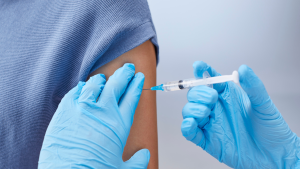
FDA Approves New Version of PrEP—Just Two Shots A Year
The FDA has approved lenacapavir as a form of pre-exposure prophylaxis (PrEP), offering a new option for HIV prevention requiring only two shots per year.

A phase III clinical trial of a new antibiotic found that it works just as well as a current drug regimen for treating gonorrhea infections. This is particularly important because the bacteria that causes gonorrhea has become resistant to most existing antibiotics.
Gonorrhea is the second most common bacterial STI reported in the United States. There were over 600,000 cases of gonorrhea diagnosed in this country in 2023. Because so many cases of gonorrhea have no symptoms, many people never get tested. It is likely there are far more annual cases. In fact, the CDC estimates there are actually 1.6 million case each year. The World Health Organization (WHO) estimates more than 80 million new cases globally.
We’ve been able to cure gonorrhea since the introduction of antibiotics almost a century ago, but we are running out of medications that work. Neisseria gonorrhoeae, the bacterium that causes this common STI, has been steadily changing to evade entire classes of antibiotics. As early as the 1940s, the bacteria was resistant to sulfanilamides. By the 1980s it was resistant to penicillins and tetetracyclines. In 2007, the CDC stopped recommending fluoroquinolones. This means that cephalosporins are the only effective treatment we have against this common STI.
Today, most people with uncomplicated gonorrhea are given a single dose shot of ceftriaxone (which is a cephalosporin). Some are also given a dose of oral azithromycin. There have been cases in a number of countries in which this treatment alone was not enough. Those patients have had to take a combination of existing antibiotics. Public health experts have feared that eventually the bacteria will develop a resistance to cephalosporins, and we will not have any new antibiotics to take their place. Thankfully, there are a few new options in development.
The newest antibiotic is called gepotidacin. It was recently approved by the FDA to treat urinary tract infections. (Antibiotic resistant UTIs have also been on the rise in recent years.) Experts believe it will also be successful against gonorrhea.
For this trial, researchers recruited 600 people ages 12 and over who had been diagnosed with a genital gonorrhea infection. Participants were from Australia, Germany, Mexico, Spain, the United Kingdom, and the United States. About half of participants were given a 500 mg shot of cefitraxon followed by one dose of azithromycin. The other half received oral gepotidacin. This group took two 3,000 milligram pills given about 12 hours apart.
The two regimens had very similar outcomes for patients with genital gonorrhea: 92.6% of the gepotidacin group was cured compared to compared with 91.2% of those treated with ceftriaxone plus azithromycin. Gepotidacin was effective against strains of gonorrhea known to be resistant to existing antibiotics.
There were some differences. The group that took the new oral medication had more gastrointestinal side effects such as nausea and diarrhea.
This clinical trial was focused on treating urogenital gonorrhea meaning infections of the vulva, vagina, cervix, penis, and urethra. However, gonorrhea can also infect the anus and throat. Some participants in this study had gonorrhea infections in their throat or rectum. Gapotidacin was able to treat some of these infections though researchers didn’t have enough data to truly analyze the results. They did have complete data on 16 participants with gonorrhea of the throat and were able to determine that 14 of them were cured. This is a good result since infections of the throat are known to be harder to treat.
In addition, gepotidacin is an oral medication. This mean people don’t have to go to a health care provider’s office to get treatment which they do for a shot. This opens up other options like telehealth prescriptions which can be easier for people to use. It also allows providers to offer expedited partner therapy (EPT). In order to stop the spread of gonorrhea, it’s important to treat all partners who may be infected. EPT is a way to get treatment to a patient’s partner without requiring that person to be seen by a provider themselves. Research has found that EPT significantly lowers the chance of reinfection.
As ASHA reported previously, there is another new drug called zoliflodacin which also had success against gonorrhea in a clinical trial. The introduction of new treatments that can help us fight antibiotic resistance is great news for patients and providers.
Learn more about these two common—and curable—infections in this printable fact sheet. It covers the many things these two STIs have in common and includes information on testing, treatment, and staying healthy.

The FDA has approved lenacapavir as a form of pre-exposure prophylaxis (PrEP), offering a new option for HIV prevention requiring only two shots per year.

On a recent episode of Love Island, a cast member sugested that we could blame our current STI epidemic on men who had sex with animals. She pointed to koalas with chlamydia as an example. There’s some truth here, but also a lot of misinformation.

A new report from the Centers for Disease Control (CDC) shows that we’re missing opportunities to prevent congenital syphilis and save lives.

Currently, condoms are the only widely available, proven method for reducing transmission of HIV and other sexually transmitted infections (STIs) during sex. Condoms work.

Anal sex may have once been thought of more taboo than other sexual behaviors, but today we know it’s a perfectly normal way to find sexual pleasure.

It’s time to celebrate the start of summer! June is filled with national observances to help you start the summer off right. We’re here to help make June the start of a #safesexysummer.

There’s potential good news in gonorrhea prevention as a series of studies suggests that certain meningococcal B (MenB) vaccines can reduce the risk of gonorrhea.

There is new guidance on pain management for IUD insertion and acknowledgement that providers often underestimate the pain patients feel during their procedures.
ASHA believes that all people have the right to the information and services that will help them to have optimum sexual health. We envision a time when stigma is no longer associated with sexual health and our nation is united in its belief that sexuality is a normal, healthy, and positive aspect of human life.
ABOUT
GET INVOLVED
ASHA WEBSITES
GET HELP
© 2025 American Sexual Health Association